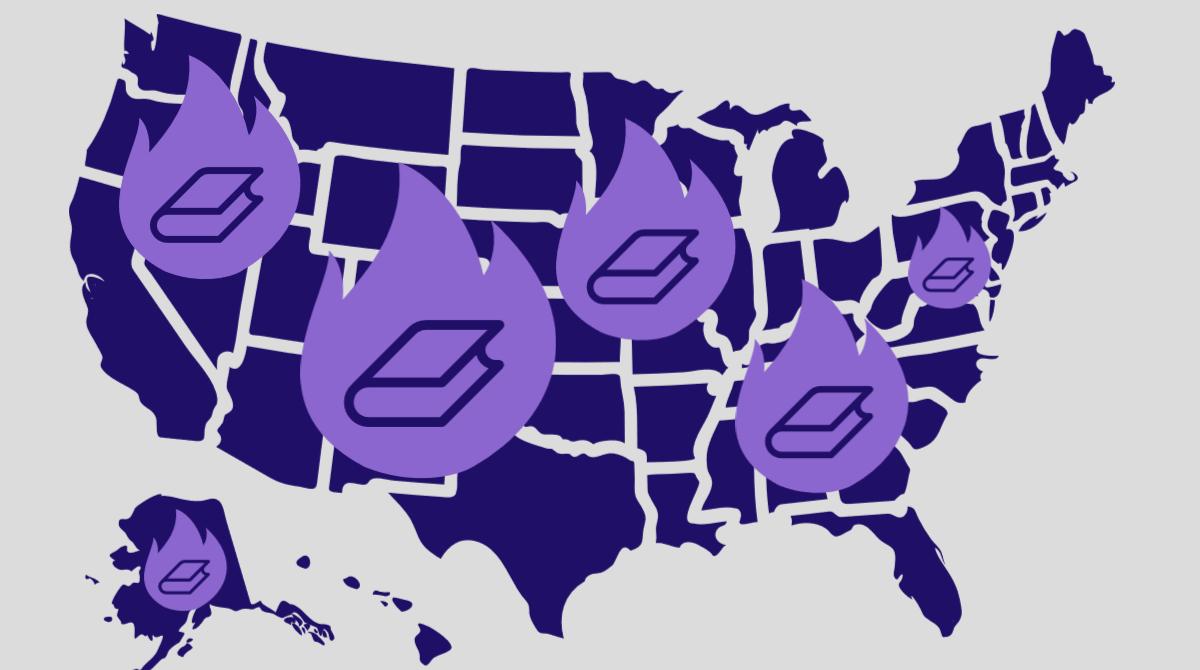Libraries and schools across the country are experiencing unprecedented levels of attempts to ban or remove books from their shelves. I Love Libraries will continue to raise awareness by highlighting attempts to censor library materials, as well as efforts by librarians, parents, students, and concerned citizens to push back against them. This report includes news from New Hampshire, Maryland, and Alabama, as well as a look at how psychologists are fighting censorship to keep culturally diverse books available to everyone.
Become a Supporter
New Hampshire governor vetoes Republican-backed public school book ban bill
New Hampshire Governor Kelly Ayotte vetoed a bill July 15 that would have allowed parents to request certain books and materials be removed from their child’s school, reports New Hampshire Public Radio.
The Republican-backed bill prohibited “material that is obscene or harmful to minors in schools and create[d] a procedure for removal and cause of action.” It specifically targeted books, films, magazines, plays, music, and other items that depicted nudity and sexual contact unless the school could show they had “serious” scientific, educational, artistic or political value.
The state’s largest teacher’s union applauded Ayotte’s veto in a statement Tuesday.
“Every student deserves to see themselves reflected in the pages of their books,” said Megan Tuttle, president of the New Hampshire chapter of the National Education Association (NEA-NH). “NEA-NH applauds Governor Ayotte for standing up for the freedom to read in New Hampshire. We hope this book ban bill veto represents a changing tide at the State House and call on lawmakers to listen to Granite Staters who overwhelmingly oppose classroom censorship efforts.”
Maryland school’s decision to ban book has parents, teachers voicing concerns
Harford County (Md.) parents and teachers spoke out July 21 against a local school board’s decision to ban an award-winning illustrated novel, “Flamer” by Mike Curato from its libraries, reports CBS News. “Flamer” is the first book to be removed by the district after it created a process to review books flagged by concerned parents.
“Flamer” is about a teenage boy who, as he “navigates friendships, deals with bullies, and spends time with Elias (a boy he can’t stop thinking about), he finds himself on a path of self-discovery and acceptance,” according to Curato. It was previously approved by district committees, but parents said the school board voted to ban the book during a closed-door session in late June after public appeals.
Members of the advocacy group Together We Will—Harford County led a protest before the county school board meeting. In a statement, the group said the decision and process to ban the book “threatens student rights.”
“In the school system, parents can opt out of any book that they want for their child. There is already plenty of support or protection for any parent who doesn’t want their child to read a book,” added Delane Lewis, president of Together We Will. “What we have is the Board of Education stepping in front of parents and telling them what they should or shouldn’t have their children read.”
Alabama Public Library Service bans books connected to ‘gender ideology’
The chair of an agency that oversees the distribution of funds to Alabama libraries said he will prohibit libraries from having materials in their collections pertaining to what he called “gender ideology,” reports Alabama Reflector.
John Wahl, chair of the Alabama Public Library Service (APLS) board, wrote in a July 16 letter sent to local libraries throughout the state that APLS will abide by an executive order issued by President Trump stating that no federal funds will be used to promote “gender ideology.” And as a result, APLS will instruct libraries throughout Alabama to review their collections and policies to ensure they comply with the executive order.
“This letter makes it clear that federal taxpayer dollars cannot be used to push gender ideology on our children,” Wahl said in a statement. “Libraries should be places of learning, not platforms for social agendas.” The directive, issued one day before the APLS’ scheduled meeting on Thursday, expands on previous attempts made by the APLS Board to restrict access to library materials touching on transgender and LGBTQ+ issues.
According to the letter, libraries are to review their collections, programming, and policies to ensure they do not promote gender ideology.
“Failure to comply with these new federal guidelines will result in the loss of grant eligibility, which could significantly impact library funding and operations,” Wahl said in the letter. “To avoid any disruption of grants, I strongly urge all library directors to conduct a thorough review of their library’s policies, collections, and programming to ensure full compliance with this executive order.”
Trump’s executive order from January says that “invalidating the true and biological category of ‘woman’ improperly transforms laws and policies designed to protect sex-based opportunities into laws and policies that undermine them, replacing longstanding, cherished legal rights and values with an identity-based, inchoate social concept.” The order does not define what amounts to gender ideology.
Alyx Kim-Yohn, an organizer with the Alabama Transgender Rights Action Coalition, said that APLS’s directive endangers the transgender community.
“It seems fairly innocuous to remove a book, until you look at the real lived experiences of trans folks who go through their adolescence never knowing how to describe their gender or their sexuality, never meeting people like them,” Kim-Yohn said. “That happens as a direct result of not having access to stories about themselves or meeting other people like them.”
Taking a stand against book bans: How psychologists are fighting censorship to keep culturally diverse books available to everyone
“As book bans continue to materialize, psychologists are working hard on the front lines of censorship, raising awareness, informing and advising education policymakers, and partnering with literacy organizations, such as the American Library Association (ALA) and We Need Diverse Books, to keep books with culturally diverse content available,” writes Rachel Brooks for the American Psychological Association.
“Unrestricted access to books exposes people, including children, to critical material about history and human behavior—and prepares future psychologists to be culturally competent. ‘It’s valuable, not just for students planning to go into the psychology field or related fields,’ but simply ‘to know as a human being how you and other people work,’ said Jacqueline Toner, PhD, a clinical psychologist and author of children’s books published by APA’s Magination Press.”
Brooks continues: “Psychologists are finding ways beyond academic work to leverage their training in these efforts. Allison Bashe, PhD, a clinical psychologist in Pennsylvania who specializes in treatment for adolescents and adults, addressed her local school board when 13 books—the majority of which were written by or about people with a marginalized identity—were challenged unsuccessfully in 2023. Bashe argued that books are ‘not a substitute for therapy or group therapy,’ but that it can be comforting for children to understand they are not alone in an experience.”
Take action
Alarmed by the escalating attempts to censor books? Here are six steps you can take now to protect the freedom to read.
- Follow news and social media in your community and state to keep apprised of organizations working to censor library or school materials.
- Show up for library workers at school or library board meetings and speak as a library advocate and community stakeholder who supports a parent’s right to restrict reading materials for their own child but not for all
- Help provide a safety net for library professionals as they defend intellectual freedom in their communities by giving to the LeRoy C. Merritt Humanitarian Fund.
- Educate friends, neighbors, and family members about censorship and how it harms communities. Share information from Banned Books Week.
- Join the Unite Against Book Bans movement and visit our Fight Censorship page to learn what you can do to defend the freedom to read in your community
- Become a Supporter of the American Library Association and help ALA fight for libraries and everyone’s freedom to read.
Subscribe to the I Love Libraries newsletter! You’ll get news from the library world, advocacy updates, author interviews, book lists, and more delivered to your inbox every month.


